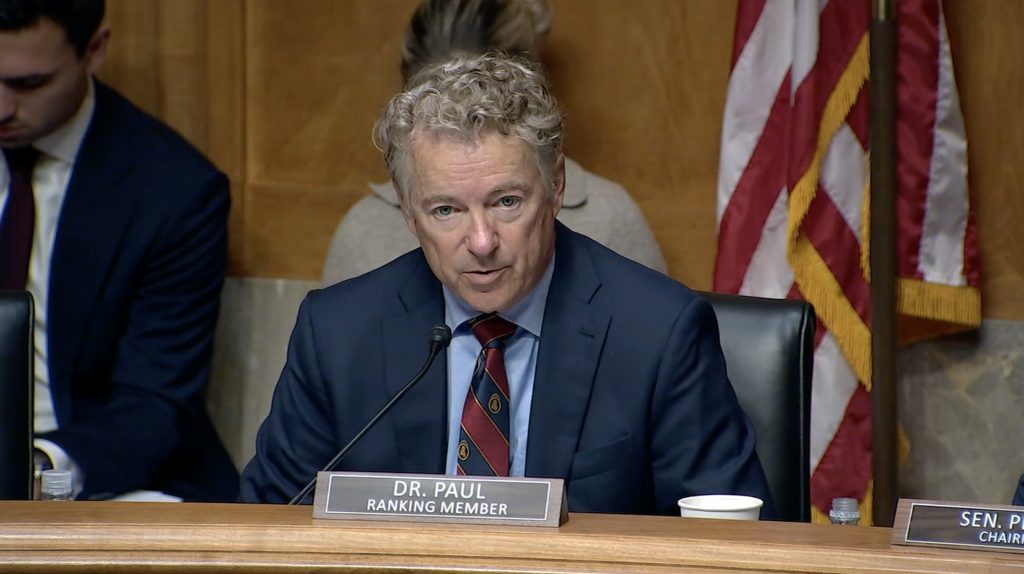WASHINGTON, D.C. – Today, U.S. Senator Rand Paul (R-KY), Ranking Member of the Senate Homeland Security and Governmental Affairs Committee, stressed the vital role free trade and open markets play in bolstering American prosperity and security. During a hearing titled “Safeguarding the Homeland: Examining Conflicts of Interest in Federal Contracting to Protect America’s Future,” Dr. Paul took aim at protectionist policies that hurt American workers and consumers while doing nothing to strengthen the nation’s geopolitical standing.
In the hearing, Dr. Paul highlighted how fostering competition and maintaining market openness has led to tangible benefits for Americans, particularly through foreign investment and global trade, and pointed to the United States’ trade relationship with China as a prime example. Despite ongoing geopolitical tensions, China remains America’s third-largest trading partner, delivering lower prices and increasing purchasing power for U.S. households—by an estimated $1,500 per year since 2001, according to research from the London School of Economics. Dr. Paul highlighted how these economic successes could be leveraged to promote peace and prosperity between the two nations. Instead, American policymakers continue to advocate for harmful and ineffective trade restrictions.
One of the hearing’s key witnesses, Bryan Riley, Director of the Free Trade Initiative National Taxpayers Union discussed how tariffs intended to punish China have been ineffective and instead cost the average household $1700. Riley also highlighted that our strongest link to China is not our trade relationship but the overwhelming amount of debt the United States owes to China.
Dr. Paul made it abundantly clear that diplomacy and free trade should be America’s tools for reducing tensions, not more counterproductive heavy-handed government mandates and sanctions. Moving towards a ban on trade with China would not only hinder efforts to reduce tensions but ensure an adversarial relationship with another global power for years to come. Dr. Paul reiterated the need for smarter diplomacy and reliance on free markets as a means to secure long-term peace and prosperity.

View the Ranking Member’s opening statement here and questioning here.
Opening remarks as prepared below:
In a speech in 1985, President Ronald Reagan addressed an audience of business and trade leaders stating, “I, like you, recognize the inescapable conclusion that all of history has taught: the freer the flow of world trade, the stronger the tides for human progress and peace among nations.”
While today’s topic is seemingly about conflicts of interest, this hearing is yet one more opportunity for Washington to reject this conclusion in its insatiable desire to impose sanctions on China.
While it is clear that we now have an adversarial relationship with China, there is another way. In the last 30 years, it is undeniable that economic interaction between the U.S. and China has been a substantial driver of American economic growth. As President Reagan pointed out nearly 40 years ago, trade will not only strengthen the tides of human progress, but also increase the prospects for peace.
The London School of Economics recently found that trade with China has boosted the average American household’s purchasing power by $1,500 per year since 2001. These effects are substantially higher among low-income households reaching as high as an additional $1,700 per year in purchasing power.
Studies by Oxford and Harvard have found that trade with China has led to a net job creation. In 2019 alone, trade with China was directly responsible for 1.2 million American jobs.
Despite the tense relationship we’ve had with China since 2017, China remains the U.S.’s third largest trading partner behind Mexico and Canada accounting for 10.5 percent of all American trade in 2024. China also remains the world’s second largest consumer market only behind the U.S.
Even so, many in the Senate fail to recognize the tradeoffs that come with antagonistic and extreme restrictions foreign trade of goods and services. It is not just China that suffers from these policies, but also American households, American small business owners, and even, at times, American strategic objectives.
Some argue that we should prioritize domestic contractors. A recent report from the Peterson Institute found that in 2017 alone Buy American requirements cost the U.S. taxpayers $94 billion. That is effectively a $715 tax per American family. To make matters worse, the same study found that the mandates had little to no effect on net job growth. So, even American workers, who are also consumers, are made poorer by these requirements. Another recent study found that repealing all “Buy American” mandates on U.S. procurement could even generate an additional 300,000 jobs and lead to significant advancements in U.S. infrastructure goals.
Unserious legislation that seeks to comprehensively ban firms that sell to foreign markets from federal contracts not only harms the competitiveness and dynamism of U.S. businesses contracting with the federal government, but also the strategic aims and interest of the U.S. government itself.
I look forward to hearing from our witnesses about how to simultaneously mitigate the risks that may come from conflicts of interest, while still maintaining the competitiveness and dynamism brought about by the free markets and free trade that makes all Americans more prosperous.
###